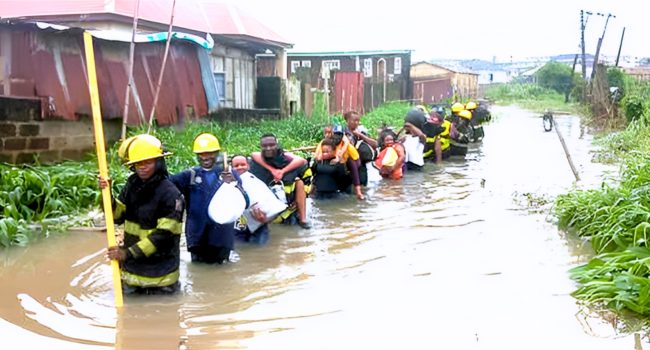Lagos Government Urges Residents in Flood-Prone Areas to Relocate as Heavy Rains Persist

The Lagos State Government has issued a renewed warning to residents living in low-lying areas of the state to urgently relocate to safer grounds as the city braces for intensified rainfall and the risk of flash flooding.
Speaking during an appearance on Channels Television’s Politics Today programme on Tuesday, the Commissioner for the Environment and Water Resources, Tokunbo Wahab, specifically named parts of Ajegunle (Ajilete axis), Ikorodu’s coastline communities including Majidu, and some sections of the Lekki corridor as areas vulnerable to serious flooding.
“Those around the Ajilete axis of Lagos, that’s Ajegunle, they have to move. Those around the coastline of Ikorodu—Majidu—have to move. Some areas around the Lekki corridor too, not all,” Wahab cautioned.
He further noted that residents in Isheri, particularly around the OPIC axis, should remain on high alert as the season’s rainfall continues. On a reassuring note, he identified Epe, Mushin, and Ikeja as relatively safe zones less likely to be affected by the floods.
Wahab attributed the looming threat to the city’s coastal geography, combined with the evolving effects of climate change, which he said have increased Lagos’ exposure to unpredictable and intense weather conditions.
“Lagos will be exposed to the vagaries of climate change, and that means Lagos will have flash flooding,” Wahab stated. “But as a state, we must provide resilient infrastructure, and we have to tell our people to be responsible.”
The warning comes in the wake of severe rainfall that began late Sunday and continued non-stop into Monday evening, leaving several communities across Lagos flooded and traffic disrupted. The heavy downpour overwhelmed drainage systems and further heightened fears of more flooding in the weeks ahead.
The commissioner cited forecasts from the Nigerian Meteorological Agency (NiMet), which predict that Lagos will receive significantly more rainfall this year compared to 2024. He advised residents in lowland areas to temporarily move to higher grounds until the rainy season subsides.
Despite the growing concerns, Wahab assured Lagosians that the government is actively addressing the situation by clearing drainage channels and expanding flood pathways to minimize the damage caused by the rains.
“We won’t tell Lagosians lies,” Wahab said. “If nature takes its course, what we can do is to mitigate its impact.”
He urged the public to remain calm and cooperate with government efforts, stressing that managing the effects of climate-induced flooding requires both infrastructure readiness and community responsibility.
As the rains intensify, residents are advised to stay informed, follow official advisories, and prioritize safety over convenience in flood-prone zones.









